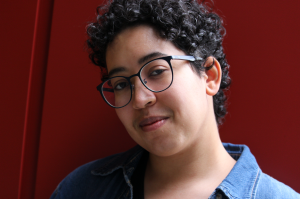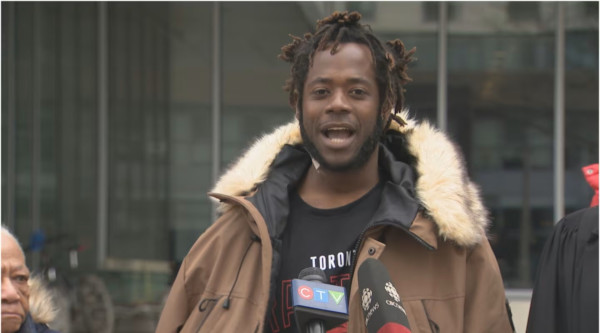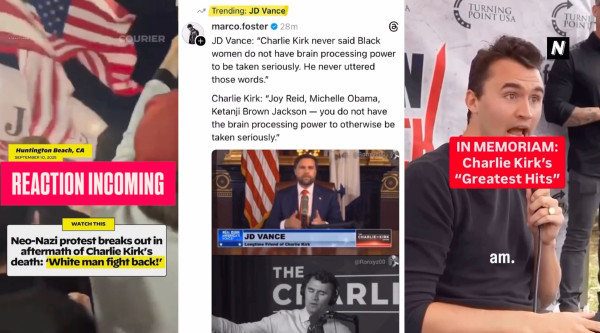When I first realized that my racial identity was more than pigmentation, I went mad. The weight of all of the memories of experiencing racial trauma finally hit me. I started cutting white people out of my life and planned a journey to Ghana. I became spiritual. This was in the late winter of 2015.
Looking back on my journey in and out of psychiatric hospitals and psychotic episodes, I am struck with a gratitude that lives in the deepest fibre of my being. Madness saved me from a worse delusion: namely, the delusion that everything is tolerable in a thoroughly anti-Black society. It was a wake-up call. I am now awake and ready to dismantle, and I thank madness for that.
I had learned all my life to erase myself and roll my eyes at racial violence. I am light-skinned, racially ambiguous and I grew up primarily being raised by my white mother in the presence of her shitty white men partners. I didn’t understand the significance of my racial identity and could barely name it. White people in white-flight Alberta had always downplayed my Blackness or brought attention to it in eye-roll worthy, racist ways.
When I finally realized that I wasn’t just like a white person, that my identity mattered and that I didn’t need to put up with so much white nonsense, I was in my fourth year of university.
I had experienced my share of violent classroom incidents. In my second year of university, I was gaslit by a white woman Anthropology professor about my sense that the N-word is not a word for everyone to use. She had shown us a video of white man comedian George Carlin advocating for “everyone” to use the N-word in the spirit of detoxifying the slur. No one in that classroom spoke up on my behalf when I pushed back against the message being uplifted by the professor, who shared the Carlin video. The class consisted of about 200 students, most of whom were white and East Asian. I was the only Black student in the class. One straight white man student even brought up a South Park episode as a model for how “everyone” can use the homophobic F slur—he said the actual word, too.
Two years later, a white woman roommate also retold me a racist joke that her Victorian Literature professor had told the class. The professor who told the joke parroted what poor white people had said to a reporter in a video that the professor had seen. In the video, the people are being asked who they’re voting for, and they respond, “We’re voting for the n*gger!” They were talking about Barack Obama. My roommate made a second-hand impression of these people saying the word and seemed to be amused by the fact that this professor had said it.
But the straw that broke the camel’s back in 2015—the year everything came undone for me—was an incident in my fourth-year English Romanticism class. In this particularly unravelling incident, a white man professor asked me if he could share my reading of an abolitionist poem about an enslaved Black child. I had posted my reading to the class blog, as we were assigned to make a certain number of weekly posts. The poem “The Little Black Boy” was written by William Blake, a white man writer in the 18th Century. The teacher had said that he liked my analysis, which surprised and excited me.
It was to my great discomfort and dismay that he critiqued the post and offered his own racist interpretation of the poem. The poem was clearly about its speaker’s internalized racism. Yet the professor upheld this character’s point of view as a model for racial healing. In his interpretation, the little Black boy’s desire to be “like” the little white boy in the afterlife so that the little white boy will “then love him” was a good thing. The little Black boy’s understanding of his Blackness as representing “bereavement of light” also did not represent internalized racism to this white man. These phrases and ideas meant that the little Black boy was willing to overcome the differences with the little white boy and be his friend.
Because the poem did not make its critique of internalized racism explicit, it was easy enough for this white man to gloss over the poem’s critique of oppressive race relations. This is a maddening phenomenon that many Black folks know all too well. White people take Black people’s experiences of racism out of context and try to twist them into something else dismissively.
When I suggested that the poem is supposed to present the reader with the little Black boy’s internalized racism, the professor said, “Maybe the little Black boy is kind of stupid. Why does he want the little white boy to like him anyway?” He smiled with apparent amusement that came off as if he were mocking the little Black boy.
Another white-bodied, non-Black professor was present to evaluate this professor the whole time. She laughed light-heartedly when I responded to the professor’s critique and when I subsequently interrupted him, trying to speak my mind.
At one point, possibly in response to my interruption, a British white woman student turned around in her seat and said, “Who do you think you are?!” in a hostile tone. Neither professor present took issue with this aggression, even though the student approached me and apologized at the end of the class, declaring that she was working on unlearning racism.
But because the professor who taught this horrible class was warm and friendly throughout the conversation, my fawn trauma response drove me to thank him for the space he created, hoping he would learn from his mistakes. (He didn’t. This wasn’t the only racist incident in that class.)
I continued to experience significant stress and anxiety after this incident, to the point that I experienced an eczema flare-up.
Added to that, many of my social media contacts stopped engaging with my posts whenever I wrote about racism.
Every doctor I went to gaslit me.
One East Asian woman doctor told me that “Vancouver is not a racist place,” and seemed to suggest that I had lost touch with reality due to my childhood sexual trauma. She referred me to a South Asian woman psychiatrist who agreed that racism was a thing in Vancouver. Still, she told me that my “ethnicity is weird like Barack Obama” and that people will misunderstand me wherever I go. When I shared my sexual trauma with her and told her about the paranoia that I experienced as a child, she told me, “You have been through a lot. Stay strong.” I was sent home without any follow-up.
I would land in a psych ward less than two months later when a distantly related family member brought me back to Canada from Ghana. When I arrived, I was in a state of acute psychosis, believing that everyone was talking about my racial identity and sexual trauma. It was only years later, in 2023, that I would uncover research that seemed to finally validate my hunch that my psychosis was a racial trauma response.
During my psychotic episode in 2015, I was confused about many things, but I knew that I was racially traumatized. I knew that I didn’t know how to be me. Yet no clinician seemed to care. I talked to one white South African doctor in Calgary about my sense that I had a “very mixed mind,” trying to articulate the racial anxiety that I was experiencing as a mixed person. He dismissed what I was saying about experiencing an identity crisis. He tried to normalize it in terms of Erik Erikson’s theory that identity crises are normal for all young people.
I left the hospital feeling defeated. Like my life had no meaning or purpose and I had embarrassed myself in front of others during the number of months I experienced acute psychosis.
In 2016, I was diagnosed with schizophrenia. Later that year, I met a sexual assault counsellor who told me in passing that Black folks are disproportionately affected by schizophrenia. However, I was unable to track down the source of her information.
A year later in 2017, I came across Simon Dein and Kamaldeep Singh Bhui’s 2013 review of UK-based anthropological and epidemiological research on psychosis, race and migration. Across the studies that they review, “African Caribbean” folks are “consistently identified as “3-12 times more likely to receive a diagnosis of schizophrenia than their white English counterparts” and that “children born of first-generation migrants” seem to face a greater risk of developing schizophrenia “than their parents.”
This research was compelling and validating for me. Still, it wasn’t until I came across a third source linking schizophrenia and anti-Blackness that I could no longer ignore the unjust nature of the treatment that I had received from provincially regulated clinicians in both Alberta and BC.
Medication has been crucial to my wellness. But for the longest time, I refused to take it. In fairness to myself, how was I to trust the chemicals offered by doctors who gaslit me about my trauma and its impacts on me when the side effects sounded so scary?
I must have been researching whether or not I would need to take medication for the rest of my life when I came across an article by Tanya Luhrmann in The Wilson Quarterly.
Having done my own research on psychosis, there is much in Luhrmann’s article with which I can't entirely agree. However, Luhrmann’s article did inadvertently validate my hunch about the relationship between schizophrenia and anti-Black racism.
Luhrmann names that “dark-skinned migrants to Europe, mostly from the Caribbean or sub-Saharan Africa, are at risk of developing schizophrenia at rates as much as 10 times higher than those of white Europeans.” Crucially, she highlights one “disconcerting finding” which suggests that “if you have dark skin, your risk of falling victim to schizophrenia increases as your neighborhood whitens,” as Luhrmann puts it. A 2021 research review and qualitative study by Felicia Boma Larizidou and others notes “higher psychosis rates among Black people and People of Color when they live in less diverse neighborhoods and experience higher rates of social discrimination.”
There is also compelling research done by Dr. Kwame McKenzie from the Canadian Centre of Mental Health Addiction, demonstrating an association between systemic anti-Black racism and psychosis.
I am the child of a first-generation Black newcomer and my racial demographic comprised a fraction of a percentage of the population of the very white community in which I grew up. I was raised to always doubt my inner and experiential wisdom, being the child of a mother who frequently gaslit me about the sexual violence that I faced as a child—primarily from white boys and men.
When I read Lurhmann’s piece in The Wilson Quarterly and Dein and Singh Bhui’s research review, I was at first excited but also confused. These authors had shied away from directly linking anti-Black racism to disproportionate rates of psychosis among Black folks.
Luhrmann asserts, “Some observers think that the epidemiologic finding is a stark story about the way racism gets under the skin and drives people mad. It is probably more complicated than that.”
The “epidemiologic finding” that she is referring to is the finding that identifies dark-skinned Black folks as disproportionately represented among those diagnosed with schizophrenia. Luhrmann suggests that for many Black migrants, living in a racist society produces distress, but this distress is more directly caused by loneliness and by a sense of being trapped than by interpersonal experiences of racism. She suspects that such loneliness and such a sense of being trapped bear a more direct effect on the development of psychosis among Black folks in predominantly white societies than racism, even as she names that such loneliness and such a sense of being trapped are the effects of living in a racist society.
According to Luhrmann, the phenomenon of Black and dark-skinned people being diagnosed with schizophrenia at higher rates than their white counterparts “has been shown by so many studies conducted with such methodological care that it cannot be dismissed as diagnostic racism…”
Lurhmann can see that something is up with the quality of life that Black and dark-skinned migrants experience in predominantly white societies, but she shies away from suggesting that racism is behind this demographic’s disproportionate rates of developing schizophrenia.
Seeking validation about the pain of experiencing anti-Blackness from non-Black people can be incredibly exhausting and crazy-making. I yearned for any source that might suggest that the ordeal that I had experienced—the madness that felt like a response to racial trauma—made sense in any way. I needed to know that my prior suffering was not merely a dream from which I was expected to exit and return to my uncomfortable, whitewashed life in white-dominated spaces.
I was grateful, relieved and in no small sense annoyed when I finally encountered the research review and qualitative study by Larizidou and others that directly linked the disproportionate development of psychosis among all People of Colour to racism. The research review seemed to show the particularly debilitating nature of anti-Blackness, as it stressed that Black people are especially overrepresented among those with psychosis.
Clinicians have long suspected that prolonged exposure to trauma can have adverse physiological impacts. Adverse Childhood Experiences, or ACES, have been linked to chronic health issues and diseases. Yet, for some reason, schizophrenia and other psychotic disorders are often excluded from educational resources on ACES.
I hope that my writing finds other mad Black folks and mad Folks of Colour. I hope that mad Black people can look at this piece when they are doubting themselves and their experiences and are obsessively searching the internet for answers, as I have done on so many occasions.
To mad Black readers out there, you are not dreaming it up. Anti-Blackness in Canada is truly unbearable. You deserve so much better. We all do.

 By
By 








